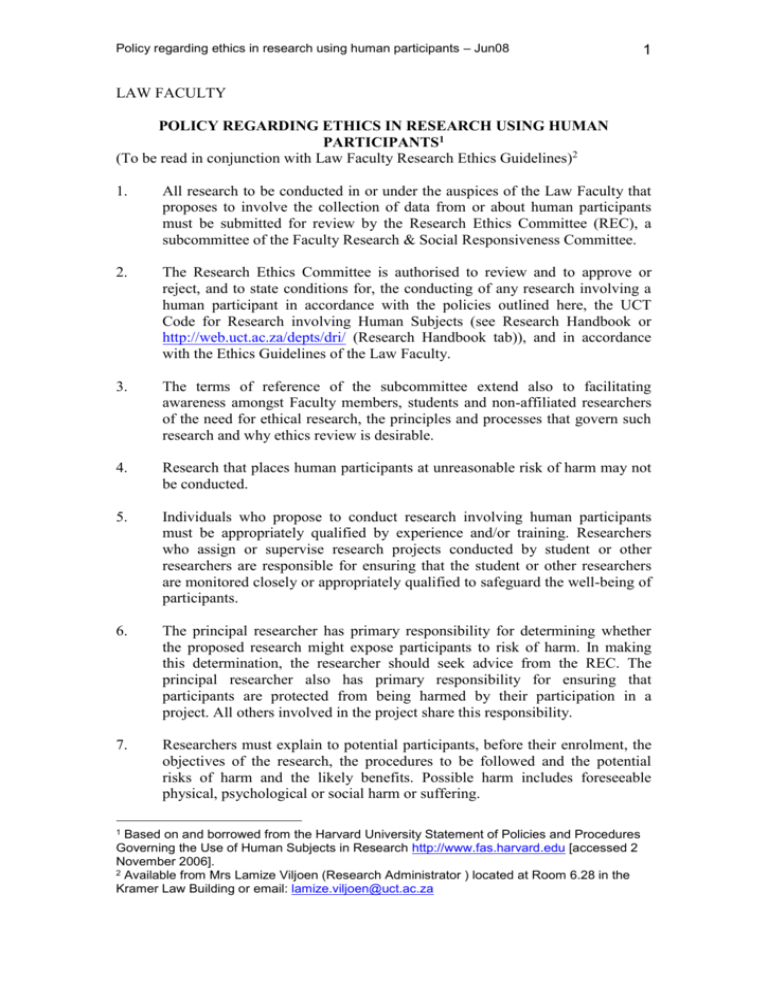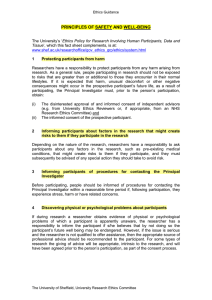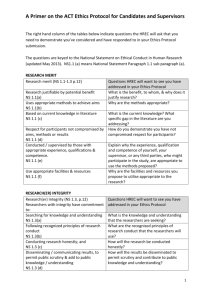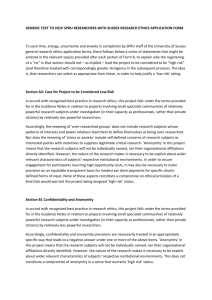Law Faculty Research Ethics Policy (Appendix 1)
advertisement

Policy regarding ethics in research using human participants – Jun08 1 LAW FACULTY POLICY REGARDING ETHICS IN RESEARCH USING HUMAN PARTICIPANTS1 (To be read in conjunction with Law Faculty Research Ethics Guidelines)2 1. All research to be conducted in or under the auspices of the Law Faculty that proposes to involve the collection of data from or about human participants must be submitted for review by the Research Ethics Committee (REC), a subcommittee of the Faculty Research & Social Responsiveness Committee. 2. The Research Ethics Committee is authorised to review and to approve or reject, and to state conditions for, the conducting of any research involving a human participant in accordance with the policies outlined here, the UCT Code for Research involving Human Subjects (see Research Handbook or http://web.uct.ac.za/depts/dri/ (Research Handbook tab)), and in accordance with the Ethics Guidelines of the Law Faculty. 3. The terms of reference of the subcommittee extend also to facilitating awareness amongst Faculty members, students and non-affiliated researchers of the need for ethical research, the principles and processes that govern such research and why ethics review is desirable. 4. Research that places human participants at unreasonable risk of harm may not be conducted. 5. Individuals who propose to conduct research involving human participants must be appropriately qualified by experience and/or training. Researchers who assign or supervise research projects conducted by student or other researchers are responsible for ensuring that the student or other researchers are monitored closely or appropriately qualified to safeguard the well-being of participants. 6. The principal researcher has primary responsibility for determining whether the proposed research might expose participants to risk of harm. In making this determination, the researcher should seek advice from the REC. The principal researcher also has primary responsibility for ensuring that participants are protected from being harmed by their participation in a project. All others involved in the project share this responsibility. 7. Researchers must explain to potential participants, before their enrolment, the objectives of the research, the procedures to be followed and the potential risks of harm and the likely benefits. Possible harm includes foreseeable physical, psychological or social harm or suffering. 1 Based on and borrowed from the Harvard University Statement of Policies and Procedures Governing the Use of Human Subjects in Research http://www.fas.harvard.edu [accessed 2 November 2006]. 2 Available from Mrs Lamize Viljoen (Research Administrator ) located at Room 6.28 in the Kramer Law Building or email: lamize.viljoen@uct.ac.za 2 Participants must be able to choose freely but responsibly whether to participate in the research project, which means they must have a reasonable understanding of the consequences of participation. Potential participants must not be induced by means or circumstances that affect their ability to choose freely whether to participate. In the case of potential participants who are not legally capable to consent to participation, those responsible for their wellbeing must be able to choose freely whether to give permission for the person concerned to participate and the person must assent to participation. The REC may waive some or all of these requirements only when persuaded that the research cannot practicably be conducted otherwise, that the potential value of the research outweighs the possible indignity of the participant and that the participant risks no other harm from participating. The REC may also stipulate that additional information about the project be provided to the participants after their participation, eg where the research involves some deception of participants. 8. Researchers must respect the privacy of participants. They must protect confidentiality of information provided by participants; however, they must inform participants in advance of any limits on the ability to ensure confidentiality. 9. Researchers must disclose to participants, upon request, the source of financial support for the research. 10. Potential participants must understand clearly that they are free to withdraw from the project at any time without prejudice. Participants who indicate a wish to withdraw must be allowed to do so promptly. D:\533568397.Doc











